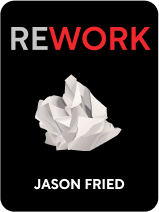

This article is an excerpt from the Shortform book guide to "Rework" by Jason Fried and David Heinemeier Hansson. Shortform has the world's best summaries and analyses of books you should be reading.
Like this article? Sign up for a free trial here .
Do you dream of starting your own business? What are some things you should know before you take the plunge?
Starting your own business to become your own boss is a dream come true for many people. The vision is exciting, but the reality is not so much: Running a business on a tight budget, making decisions, and being a jack-of-all-trades takes both an emotional and physical toll.
From those who’ve been there and done that, here are 10 essential tips for beginning entrepreneurs.
Tip 1: Recognize Constraints Are Good for You
As a beginner entrepreneur, you’ll likely fund your venture from your own pocket. You’ll also likely be still working a day job.
Don’t view these constraints as negative limits—they actually help your business run more efficiently and economically. Also, having to work with what you have leads to creativity and innovation as you look for inventive ways to cheaply produce an excellent product.
Create constraints even if they don’t exist. When developing a new product, don’t throw tons of staff hours and money at it. Instead, allocate only bare minimum resources. That will force you to keep your product simple, which will help your company run efficiently.
Model for success: Southwest Airlines flies only Boeing 737s, so all of its excess parts fit all of its planes. Its flight crews can work any flight. The airline is simpler to manage and less expensive to maintain than airlines that use multiple types of planes.
Tip 2: Do One Project at a Time
Because resources and time are always limited, focus your energies on one idea at a time. Not every idea that comes into your head is worthy of your time, energy, or money. Limit your ideas and the best ones will float to the surface.
Tip 3: Stick to the Core of Your Business
Analyze what’s at the core of your business and make that your priority. For example, if you’ve opened a flower shop, focus on the flowers, not the vases. Sure, there’s always other stuff you could work on, but the core of your business should always take priority.
Tip 4: Ignore the Details at the Start
In the early stages of product creation, ignore tiny details, like what color it will be or where the logo will be placed, until after the prototype is functional. You can’t recognize what details matter until the project is farther along.
Model for success: A famous drawing teacher at Walt Disney Studios taught his animators not to pencil in the details of Disney characters—clothing, facial expressions, hair—during the early stages of character development. Time spent on details too early was always wasted effort.
Tip 5: Make Decisions—Don’t Sit on Them
In business, it’s dangerous to say, “Let’s decide later.” You want to keep moving forward, and that only occurs when decisions get made, even if those decisions aren’t perfect. You may think you need to wait to decide until you have more information about the choice at hand, but you’re just as likely to make a good decision today as you are tomorrow.
Don’t let the fear of making a bad decision slow you down. It’s far more productive to make the wrong decision now than to put off deciding until later. You can build on a less-than-perfect decision by making corrections and alterations. You can’t build on an empty void in which no decision was made.
Tip 6: Know That What Stays Out Matters
Your business should be extremely selective about what it doesn’t sell. You don’t need to have 50 “okay” products; you just need to have one superlative product.
Model for success: The famous Zingerman’s Deli in Ann Arbor, Michigan doesn’t carry 100 kinds of olive oil simply for the sake of filling up the shelves. The owners select only the very best olive oils they’ve personally tasted and love. They want to keep their reputation for only stocking quality products.
Tip 7: Make Your Business Timeless
Successful businesses are built around elements that people want today and will still want in the future. Your product should include features that have a permanent appeal so customers will always want it.
Model for success: When Jeff Bezos created Amazon.com, his business strategy was built around shopping desires that never change, like the desire for fast shipping and easy returns. Despite the huge diversity of goods that Amazon sells, every product comes with those same timeless features.
As you develop your company’s product, don’t waste too much time and energy trying to forecast trends or fashions. Give up on trying to stay ahead of the curve and focus on the opposite: What won’t change (in other words, what will remain popular with consumers) matters more than what will change.
Tip 8: Don’t Try to Buy a Solution to Your Problems
When your business faces a stumbling block, you may want to throw extra time, money, personnel, or other resources at the problem. After all, you want it fixed. But if you cut back rather than increase the resources devoted to that problem, you’ll make better decisions. You’ll be forced to make tough calls that you wouldn’t make otherwise.
Trying to purchase a good solution is never the answer. Fancy tools don’t help. After all, Eddie Van Halen could make a toy guitar sound amazing, and Vincent Van Gogh could paint a masterpiece with a cheap watercolor set.
Stop looking for the gadget, shortcut, or other expensive “fix” that will solve your business problems. Play your game the best you can with what you have.
Tip 9: Sell Your Collateral Products
Every business makes more than one product. If you own a lumber company, your main product is two-by-four boards, but their byproducts—sawdust and chips—can be made into particleboard and fireplace logs. Even if you don’t manufacture goods, your business still creates a product that has potential collateral products, and you should find a way to make them profitable. (For example, if your company writes software, you could also write a book about how to write software.)
Models for success: Henry Ford made Model T automobiles, but in doing so, he also created wood scraps. So he came up with a process for turning the scraps into charcoal briquets and founded another company to sell the briquets.
Tip 10: Know It’s Never Done, But Call It Finished
Most business owners put so much time and energy into creating their product that they’re afraid to release it into the world unless it’s “perfect.” They keep endlessly tinkering with their invention because they don’t think it’s “ready” yet.
Don’t put off your launch because you’re trying to attain perfection. Go ahead and unleash the earliest, not-yet-perfect version of your product. You’ll gain valuable knowledge from user feedback—you’ll learn what works and what doesn’t—and then you can launch product version 2.0.
If you find yourself hesitating to launch because you need to make a few more product adjustments, give yourself a tight deadline. For example, tell yourself that you must launch your product exactly two weeks from now. You’ll gain laser-sharp focus and stop making unnecessary tweaks.
Model for success: The upscale home-goods store Crate and Barrel didn’t get its name by accident. The owners didn’t have time to build display cabinets for their first store’s grand opening, so they used the containers that goods were packed in—crates and barrels—to display their wares. Crate and Barrel is now one of the best-known names in the home-goods business.

———End of Preview———
Like what you just read? Read the rest of the world's best book summary and analysis of Jason Fried and David Heinemeier Hansson's "Rework" at Shortform .
Here's what you'll find in our full Rework summary :
- Why the old-school process of starting a business doesn't work anymore
- Why you should completely ignore your business competition
- How to hire employees and help them thrive




